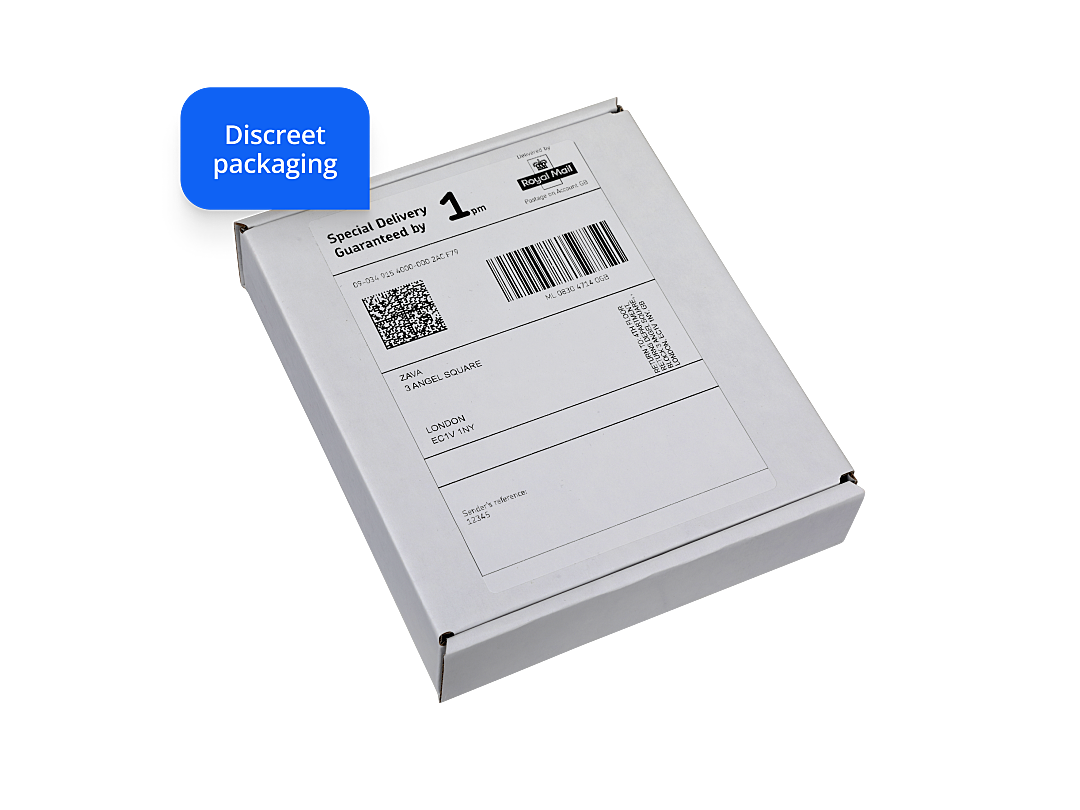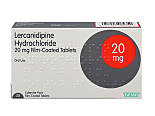



Prices from £19.99
In stock. Simply fill in a brief consultation questionnaire and one of our doctors will review your request today.
-
Lercanidipine tablets are used to treat high blood pressure. The active ingredient, lercanidipine hydrochloride, relaxes your blood vessels. This leads to a lower blood pressure. Lercanidipine is available in doses of 10mg and 20mg tablets.
You can request lercanidipine from ZAVA if:
- you’ve been taking this treatment for at least 3 months
- your blood pressure is stable
Lercanidipine is a generic, unbranded medication.



About Lercanidipine
-
-
Lercanidipine is a medicine used to lower your blood pressure, also called an antihypertensive. It is a commonly used medication used to treat and manage high blood pressure (essential hypertension). Lercanidipine is part of a group of medicines called calcium channel blockers (CCBs).
Hypertension can happen due to many reasons but often you will not feel any symptoms. You may discover you have high blood pressure during a routine check up. Your doctor may not prescribe medication immediately as they will first check how your blood pressure behaves over time.
The ideal value for blood pressure is 120/80 mmHg, but this can vary depending on the person. The top number is called the systolic blood pressure which shows the blood pressure in your arteries when your heart beats. The bottom number is called the diastolic blood pressure, which is the pressure in your arteries in between heartbeats.
When measuring your blood pressure at home, it’s a good idea to take a few readings as the initial readings can naturally be higher.
Once you have been diagnosed with high blood pressure, you may be started on a different antihypertensive like lisinopril. If you have an Afro-Caribbean background, you’re likely to be started on amlodipine or lercanidipine. Studies have shown that your blood pressure responds much better to medicines like lercanidipine if you are black.
-
-
You can take lercanidipine once daily at around the same time every day. It’s best to take lercanidipine about 15 to 20 minutes before breakfast.
Avoid drinking grapefruit juice or eating grapefruits when taking lercanidipine.
-
-
Lercanidipine is a specific type of calcium channel blocker called a dihydropyridine.
Your arteries need calcium to contract and constrict. This raises your blood pressure. Lercanidipine works by blocking how much calcium enters your arteries at the cell membrane. This allows your arteries to relax and is also known as vasodilation. This will lead to a lower blood pressure.
-
-
Lercanidipine is effective at lowering your blood pressure over a few weeks. You may not see any change in your blood pressure initially but it can take some time for the medicine to work.
Your doctor or nurse will check your blood pressure after about a month of treatment. Once your blood pressure is stable, you’ll need yearly checks up to make sure your blood pressure is still responding to treatment.
-
-
You may feel some side effects when you first take lercanidipine. These will not last long and you should feel better once your body adjusts to the medication.
The most common side effects of lercanidipine are:
- headaches
- palpitations or tachycardia (fast heart rate)
- ankle swelling (oedema)
The uncommon side effects of lercanidipine are:
- dizziness
- heartburn or indigestion
- feeling sick
- muscle pain
- feeling tired
If you feel chest pain or faint after taking lercanidipine, call 999 immediately. You should also contact the emergency department if you have an allergic reaction after taking the tablets.
For more information on the side effects of lercanidipine, read the patient information leaflet.
-
-
You can take lercanidipine to treat high blood pressure if you are over 18 years old.
You will not be able to take lercanidipine if you have certain health conditions. These include if you:
- are allergic to lercanidipine or its other ingredients
- have severe kidney problems including having dialysis
- have severe liver problems
- have heart disease, including heart failure or unstable angina
- have recently had a heart attack
- have unstable angina pectoris (chest pain on exertion)
You should tell your doctor before you take lercanidipine if you are pregnant, think you might be pregnant or are breastfeeding. They will advise what the best blood pressure treatment is for you.
If you have heart, liver or kidney problems that are not severe, speak to your doctor before using lercanidipine. They may adjust the dose to make it more suitable for you.
-
-
Lercanidipine may interact with other prescription medications you are taking. Speak to your doctor or pharmacist if you are unsure if lercanidipine will interact with your regular medications.
Lercanidipine can interact with:
- epilepsy medication, like phenytoin or carbamazepine
- some heart medications such as amiodarone, sotalol or digoxin
- midazolam
- antifungal medicines such as itraconazole or ketoconazole
- certain antibiotics such as erythromycin or clarithromycin
- antiviral medicines used to treat HIV or hepatitis, such as ritonavir
- medicines used after organ transplants, like ciclosporin
Grapefruits and grapefruit juice can interfere with how lercanidipine works. Avoid drinking or eating grapefruits when taking this medicine.
Drinking alcohol can increase the effect of lercanidipine and lower your blood pressure further. This might make you feel dizzy. Avoid drinking excessive amounts of alcohol when taking lercanidipine.
Eating foods that are high in fat or are greasy can increase how much lercanidipine is in your blood. Try to eat a balanced diet when taking blood pressure treatment as this will benefit your health in the long term.
-
-
There are alternative medicines used in the treatment of hypertension. Your doctor or nurse will advise which is the best medication for you depending on your general health and if you’re taking any other medicines.
Amlodipine, felodipine and nifedipine work in a similar way to lercanidipine. If you’re getting side effects from lercanidipine, you may be asked to try another CCB.
If suitable for you, you might be started on an ACE (angiotensin converting enzyme) inhibitor such as enalapril. ACE inhibitors can be prescribed alongside CCBs for better blood pressure management.
You could be started on indapamide, which is a type of diuretic (water tablet). Diuretics work by filtering out excess sodium from your blood into your urine. As your urine increases in sodium, the amount of water will increase too. This means you might need to go pee frequently as a side effect of indapamide.
Remember that lifestyle choices can be just as powerful in lowering your blood pressure as medication. Eating a balanced and nutritious diet and getting regular exercise, even if it’s a 15 minute walk a day, can help your blood pressure in the long term.

Dr Babak Ashrafi Clinical Lead for Service Expansion
Accreditations: BSc, MBBS, MRCGP (2008)
Babak studied medicine at King’s College London and graduated in 2003, having also gained a bachelor’s degree in Physiology during his time there. He completed his general practice (GP) training in East London, where he worked for a number of years as a partner at a large inner-city GP practice. He completed the Royal College of GPs membership exam in 2007.
Meet our doctorsLast reviewed: 30 Mar 2022
-
Lercanidipine 20mg tablets, Product Information Leaflet, EMC [accessed February 2022]
-
High blood pressure (hypertension), National Health Service [accessed February 2022]
-
Lercanidipine hydrochloride, NICE/British National Formulary [accessed February 2022]
-
Lercanidipine, National Health Service [accessed February 2022]
-
High blood pressure - symptoms and treatment, British Heart Foundation [accessed February 2022]
In order to avoid related health risks, your blood pressure needs to be kept within the normal range. Because of this, you shouldn’t miss doses of your blood pressure treatment if possible. You reorder your treatment quickly and conveniently from ZAVA, to avoid running out.








